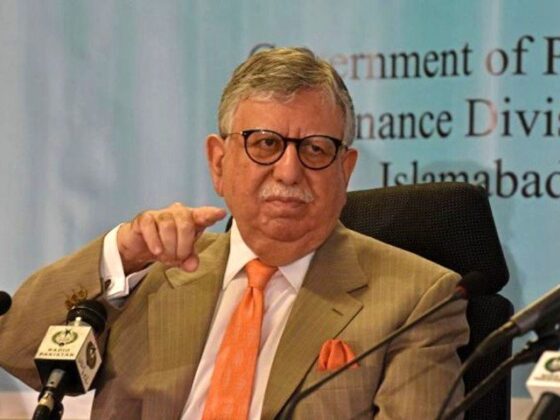ISLAMABAD: Minister for Finance and Revenue Shaukat Tarin Sunday said that economy was on the right track to post an inclusive and sustainable growth up to 05 percent during current fiscal year that would help get rid on the International Monetary Fund (IMF).
“We don’t need the IMF if we achieve sustainable growth of six percent. I don’t think we need another IMF program once we complete the ongoing extended fund facility (EFF) in September,” Tarin told Khaleej Times in an exclusive interview in Dubai.
The country is going to start a two-week process of seventh IMF review of Pakistan economy today, he said adding that the successful review would help draw another $1 billion tranche as we have already achieved the targets in December.
He said that the eighth and ninth reviews would bring the remaining $2 billion to the national kitty by September.
He said that the sustainable growth of five to six per cent was the only way to reduce dependence on IMF and other multinational donors and we are confident of achieving this target under the leadership of Prime Minister Imran Khan.
The government’s economic reforms had revived sick industries, improved the agriculture sector and boosted exports despite commodity price shock in international markets, he said adding that the country still needed to increase saving rates and revenue collection to sustain the growth momentum in coming years.
“We are working very hard to increase saving rates and tax collections as well as bridge the gap between exports and imports. Revenue collections have already hit Rs 6 trillion and next year, we will achieve Rs 8 trillion taxes,” he added.
Shaukat Tarin said that the Information Technology in the country has an immense potential to grow and the government was keen to revolutionize this sector to boost exports in coming years. We can double our traditional exports in next four to five years and lift IT exports by providing incentives to the sector and building a strong ecosystem for start-ups, he added.
In the next five years, he said our traditional exports will touch $ 60 billion plus while IT exports could be at $ 50 billion, pushing the tally to over a $100 billion annually. In addition, $ 30 billion remittances per annum will help ensure a sustainable current account surpluses,” he added.
The minister said that the government was also focusing on improving productivity by reviving industries and improving the agriculture sector with the help of China.
“We would like to consolidate our industrial sector and attract foreign investment in key industries. China will move its part of industrial units in Pakistan’s special economic zones that will generate more jobs opportunities in the country,” he added.
China has planned to shift up to 85 million jobs to foreign countries in next 10 years. We have requested Chinese leadership to move at least 10 million jobs to Pakistan by relocating its key industrial units to special economic zones in the country,” he said.
Reply to a question, the Finance Minister said that China would increase imports from Pakistan that will also improve productivity and generate more opportunities for jobs in the country.
The Chinese move will be helping us to create 1.5 million to two million jobs annually in next five years, he said adding that it would be a game-changer for Pakistan, whose 60 percent population was under the age of 30.
The Finance Minister further said that Prime Minister had successful meetings with Chinese President Xi Jinping and Premier Li Keqiang and they promised to resolve Pakistan’s economic problems.
He said that Pakistan economy was on a growth path as agriculture, industries and services sectors were performing well, but this super cycle was putting pressure on prices and causing unrest and frustration among the masses. He said commodity prices in international markets were on the rise and the government was making all-out efforts to minimize its impact on common man.
“Crude prices crossed $100 a barrel while edible oil also traded in the high territory, he said adding that government had reduced petroleum development levy to a minimum and introduced stringent measures to absorb price shocks of the super cycle.
The minister said that the prices would drastically come down in coming months after freezing petrol rates and electricity tariff at present levels until June.
Shaukat Tarin also said that the Pak rupee was stable and should trade in present range with some normal fluctuations against the US dollar and other major currencies.
To a question about the Pak rupee outlook, the minister said that it was stable at the current levels, and no more devaluation was on the cards, adding that rupee-dollar parity reflected the market trends and was unlikely to face serious volatility.
It should trade in present range with some normal fluctuations against the US dollar and other major currencies, he said adding that the government would continue to test bonds and the Sukuks market to raise funds to support foreign exchange reserves. “We have planned to raise $1 billion through an ESG-compliant Eurobond in March,” he added.
The finance minster reposed trust in Roshan Digital Accounts and its future scope to attract over nine million overseas Pakistanis worldwide and said the banks should come forward to realize the true potential of this revolutionary scheme.
He called upon the banks to adopt a ‘push strategy’ to tap more overseas Pakistanis by creating awareness about RDA and its products. The banks in UAE are doing an excellent job with an aggressive approach, and the other lenders should adopt a similar strategy in Saudi Arabia, Europe and the United States,” he added.





Great article with excellent idea! Thank you for such a valuable article. In order to continue bolstering foreign exchange reserves, the government would continue to test the bonds and Sukuks markets. I really appreciate for this great information.